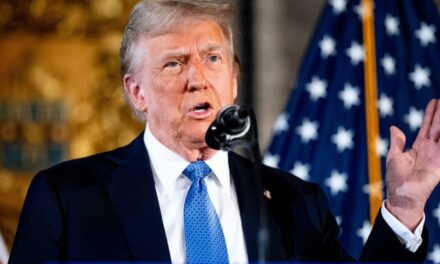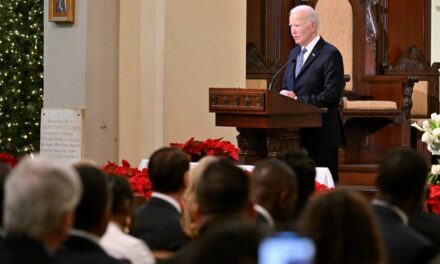We support our Publishers and Content Creators. You can view this story on their website by CLICKING HERE.
Trump didn’t rule out military force or economic coercion to get his way, as he pitched a U.S. takeover of Greenland and the Panama Canal on Jan. 8.
Leaders are pushing back after President-elect Donald Trump declined to rule out the use of economic or military coercion to assert control over Greenland and the Panama Canal.
Trump’s recent comments have sparked pushback from regional leaders.
German Chancellor Olaf Scholz, facing a February snap election triggered by a no confidence vote from parliament, said at a Jan. 8 press conference that nations should commit to respecting each other’s territorial integrity and to avoid gaining territory through force. Scholz said that this principle has been at the core of the international resistance to Russia’s 2022 invasion of Ukraine.
Without referring to Trump by name, Scholz went on to suggest that the recent comments from the United States showed a lack of understanding or commitment to respect the sovereignty of other nations.
“The principle of the inviolability of borders applies to every country, regardless of whether it lies to the east of us or the west, and every state must keep to it, regardless of whether it is a small country or a very powerful state,” he said.
In an interview with public broadcaster France Inter, French Minister for Europe and Foreign Affairs Jean-Noël Barrot said that he doesn’t believe there is a real possibility that the United States will invade Greenland, but that he thinks that international relations are trending toward coercion and threats by larger nations against weaker ones.
Barrot described Greenland as a territory of the European Union (EU), and said that the bloc would defend its territories.
“It is out of the question that the EU allows other nations of the world, whoever they are, and I would even say starting with Russia, to attack its sovereign borders,” the French official said. “We are a strong continent. We have to keep strengthening ourselves.”
In a Jan. 7 interview with the Danish state-owned TV 2, Danish Prime Minister Mette Frederiksen repeated Denmark’s position, saying, “Greenland is not for sale.”
Frederiksen said that she does not believe there is a real risk of a U.S. invasion of Greenland. She also indicated a willingness to see Trump’s Greenland rhetoric as a welcome sign of growing U.S. interest in the North Atlantic and Arctic.
The United States and Denmark are allies through NATO, and Greenland already hosts a U.S. military base.
There is a growing interest among the people of Greenland to assert full independence from Denmark, and Danish leaders have expressed some openness to the idea.
“We fully recognize that Greenland has its own ambitions,” Danish Minister of Foreign Affairs Lars Lokke Rasmussen said. “If they materialize, Greenland will become independent, though hardly with an ambition to become a federal state in the United States.”
Greenlandic Prime Minister Mute Egede, in a statement he shared on Facebook on Jan. 7, insisted that Greenlanders will decide the island’s political future.
“Our future and fight for independence is our business,” he wrote. “Others, including Danes and Americans, are entitled to their opinions, but we should not be caught up in the hysteria and let external pressures distract us from our path.”
“The sovereignty of our canal is not negotiable and is part of our history of struggle and an irreversible conquest,” Martínez-Acha said.
The Epoch Times has reached out to the Trump transition team for comment but did not receive a response by press time.
Reuters and The Associated Press contributed to this article.

 Conservative
Conservative  Search
Search Trending
Trending Current News
Current News 







